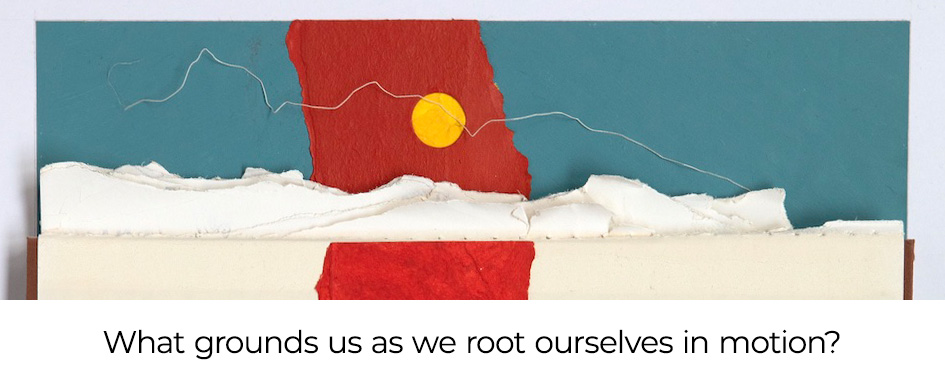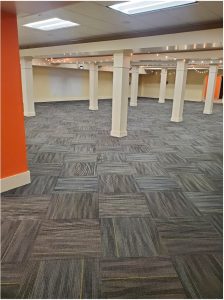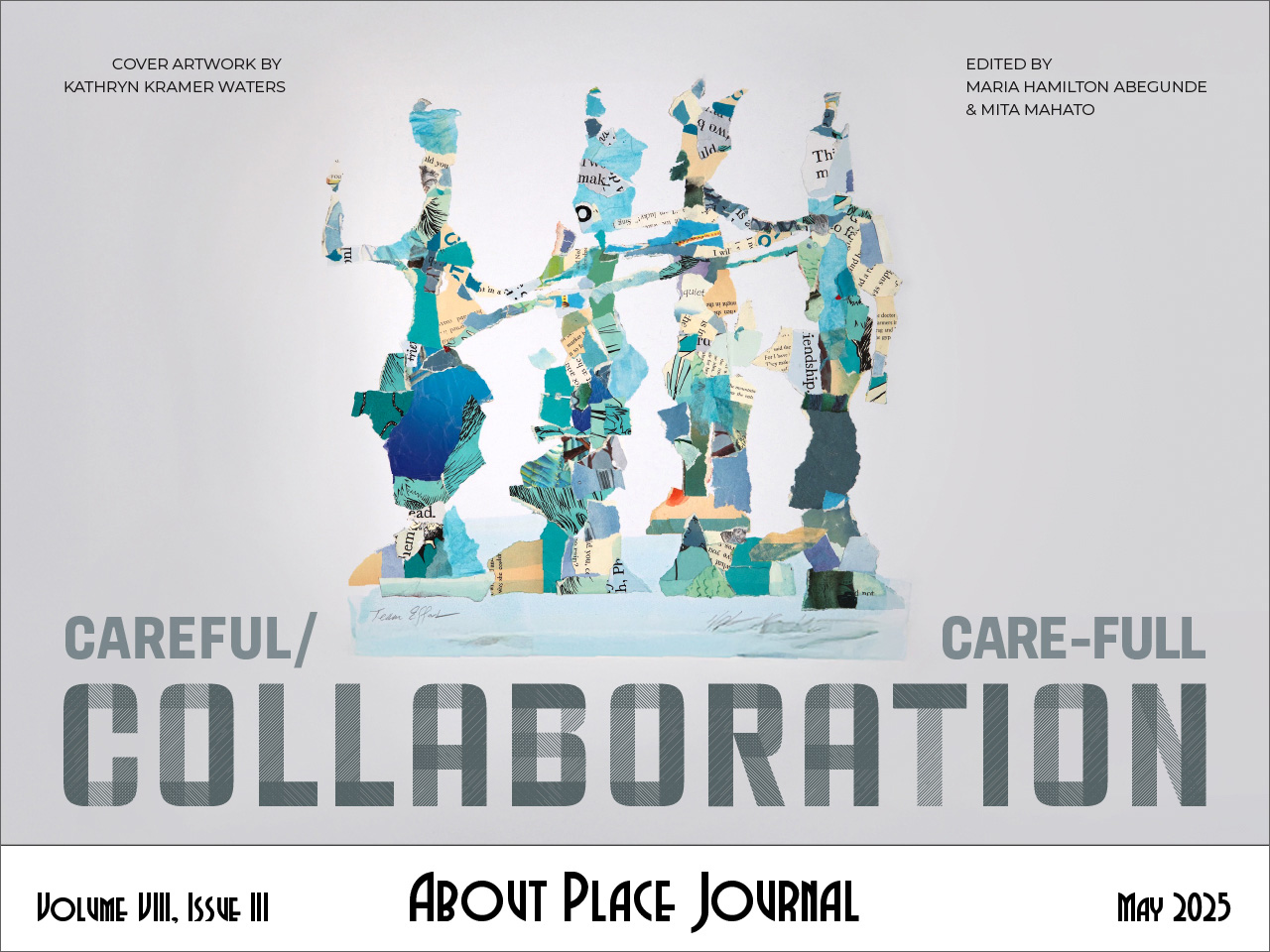They’re already waiting. I walk down the hall to unlock the door and greet our guests. I’m already thinking about them. On any given Monday, when I walk the hall to open Jubilee Café up for the night, I’m also thinking about what’s under my feet.
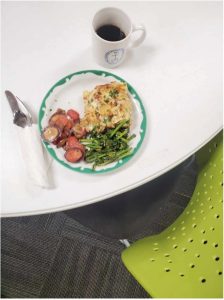
Jubilee Café is a free, weekly meal we serve to anyone who cares to eat. Jubilee is one of the things we do at Community United Church of Christ (CUCC) where I am pastor, and have been, for over 15 years. CUCC is a just-peace, theologically progressive, LGBTQIA open and affirming church located in the heart of the University of Illinois campus. Jubilee’s meals are made possible by our community partners: Sola Gratia Farm, the Eastern Illinois Food Bank, Crystal Lake Longhorns, Far East Grocery, Ye Old Donut Shop, donors, and more. Our meals are cooked largely from scratch and always served on real plates by an army of volunteers, upwards of 50 per week, including CUCC members, community folks, and college students. We served our first meal on October 1, 2017, and have been open nearly every Monday since. When the pandemic hit, we shifted overnight from our normal sit-down service to take-out.
At 2024’s end, we’d served over 25,000 meals and counting.
As I walk the hall, I’m thinking about what’s under my feet because there are blessings here. Literal blessings.
A year or so ago, Jubilee received a gift—the donation of new flooring. Julie Pryde, the director of Public Health for Champaign-Urbana, had come to Jubilee to help support a guest and drop off supplies for our free table. Jubilee’s free table is largely stocked with items from Public Health: safer sex kits, harm reduction kits, menstruation products. But a member of her staff could’ve handed off a bag of condoms and a case of Narcan. Julie came because I asked for her help with a guest whose needs I was challenged to meet. And, truly, she came because she wanted to.
Julie has long read the weekly dispatch from Jubilee Café which I post on social media each Monday night. In these posts, I list the number of meals served and what was on the menu, along with pictures of the food—people are always asking what we had for dinner—it’s that good! But I also tell a story about something that happened that evening, how someone’s life was impacted, enriched, changed. As our mission states, at Jubilee Café, we seek to restore the brokenness of our world through the simple act of eating together. We practice kindness, peace, respect, and love through relationship. We’re not the kind of church that feeds you only if you come to Bible study or worship. We’re not a pray-to-play kind of place.
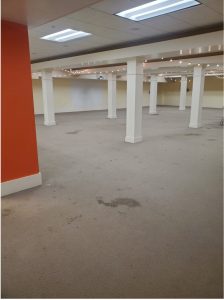
We’re just trying to be good neighbors and feed people, like Jesus did time and again. We think doing that can change the world. Julie thinks so too. “When I first went to see the Jubilee Cafe,” she said, “I was so impressed by the hospitality, the food, and how everyone there was striving to make it a true dining experience for the guests.” She noticed how careful cultivation of community in that space enriches people’s lives.
“I also noticed,” she quipped, “that the carpet had seen better days.”
She’s not wrong about that. The carpet is 15 years old, chosen long before the church ever dreamed of hosting a weekly community meal. When Julie walked in that night to help one of our guests, I didn’t know she was also the executor of The Joan Lathrop Charitable Trust, a trust intended to honor Ms. Lathrop’s work as a trailblazing social worker in our community. “I know that often infrastructure is the last priority for places that are working hard to meet the needs of the most vulnerable. I just happened to be in the position to use some of my mentor’s Trust to help the physical space to be as fabulous as the spiritual space.” Julie took one look at the decade-old carpet, a light tan color turned gray by excessive foot-traffic, asked what we would do with a substantial chunk of change, and had a check cut before week’s end.
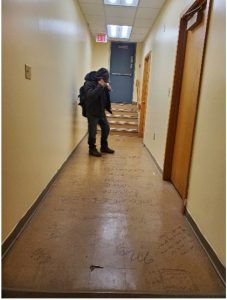
The church moved fast and began choosing new flooring right away. I mentioned the incredible gift to a colleague, Rev. Lori Bievenour, pastor of St. Peter’s UCC, Caramel, Indiana. Lori and I regularly, intentionally collab with one another. Our congregations hold similar values, and, often, face similar challenges. As we were making choices about what sort of carpet would stand up to the grind of Jubilee, Lori made a suggestion. The summer before, she texted out of the blue, to say their church was on fire; she was ok, but, please, pray. She’s been dealing with decisions (like what new carpet to choose) ever since. “Mark time,” she said, “intentionally. Make this extraordinarily ordinary occurrence of laying new flooring sacred in some way.” In that spirit, she suggested inviting the folks who will benefit most from the overhaul of the room—our Jubilee community—to take the lead.
We took Lori’s cue. On the Monday before the new floor was laid, we invited our guests and volunteers to write on the old tile in the hall. New flooring would be placed over the top, sealing in their words, just like the legend says happened with the Psalms before the labyrinth at Chartres cathedral got chiseled into the floor. Pilgrims who came to walk the labyrinth would know the words that were under them the whole way. Our pilgrims, who come to eat with us, they’ll know the words that are under them too. They will know that there are blessings, always, under their feet when they enter that space, and when they leave it to go back out into the world. It’s invisible to the naked eye, but the intention and energy remain.
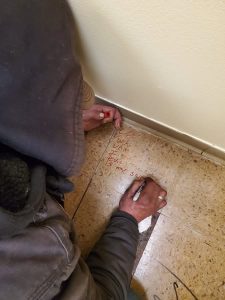
When I greeted our guests, already lined up and waiting to enter outside, on the night of the floor blessing, I explained what they could do. “I’ve got the Sharpies. Before you leave tonight, grab one, and write a blessing on the floor.” Folks listened and nodded heads in approval. When the crowd came in, they wasted no time. Some didn’t even eat first. They just grabbed markers and got down on their hands and knees to christen the floor with their words.
“Health to everyone we love,” someone wrote.
“Have hope,” another guest put down.
“Blessings for a brighter tomorrow,” another inscribed.
A few guests asked me if I would write for them. I knelt while they dictated their messages. “Tell me again,” I said, looking up at Leon from my place on the floor. Leon is one of our regular guests. He’s eaten with us from the start, “What do you want me to write?
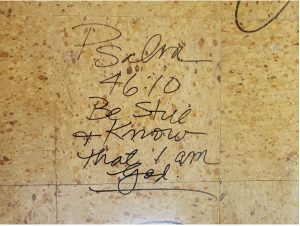
“Pastor! Psalm 46:10.”
“Which is…?” I asked, looking over my glasses at him. “Just because I’m the pastor doesn’t mean I can quote scripture just cause you’ve listed the chapter and verse!”
Leon laughed. “I got you, Pastor. I got you,” he assured, then began. “’Be still and KNOW that I am God!’ That’s Psalm 46:10. ‘Be still and know that I am God.’”
“Why that one?” I asked, writing the words in smooth, cursive script.
“That’s the verse that got me through jail, Momma. I’ve been to jail plenty of times, but I wasn’t supposed to be there then. That one,” he insisted, pointing at the words of scripture flowing from my marker, “got me THROUGH! Be still. And KNOW!” Being in jail was a humbling experience. “The worst experience in the world,” Leon would later tell me, thinking about that jail time compared to all of the times he’s walked into Jubilee. Knowing those words are below his feet gives him comfort. “It’s a message of hope. Footsteps towards God. It’s a blessing.”

Recently, we had a slow night at Jubilee. Instead of bopping from table to table, greeting guests, which is my job when we open, I take my time, linger, and really talk with folks. I sit down with Leon, and another guest named Joseph, while they finish their dinners of quiche. The custardy pies are studded with locally grown kale and green onions, all sauteed and seasoned, plus bell peppers and cheese, all nestled in flaky from-scratch crusts. Green salads with homemade croutons and roasted root vegetables, including locally grown turnips, accompany each entrée. I sip a cup of coffee while they eat, wishing I had grabbed a plate before joining them. As we talk, and laugh, Leon and I start reminiscing about the floor installation and all the messages of hope which lay beneath our feet. This is news to Joseph. He started eating with us after the floor was already in. He doesn’t know about the inscriptions. Jospeh marvels knowing he passed over all those blessings on his way in and out of the space every week. “Written into the bedrock of this place,” he says, “That’s deep.”
“It’s deep, but not unexpected,” he later says while raising his fork with another bite of quiche. Joseph has noticed intentional details about Jubilee. From the new carpet to the patio lights that swoop across the ceiling, to the music that plays over the PA and the flowers on the tables, to the fancier-than-typical soup kitchen fair and uniformed look of our apron-clad volunteers, the careful design of Jubilee is purposeful. “Being served makes me feel respected. Important,” Jospeh says. He does not feel important, not respected, in his everyday life. We serve a vast array of folks from all walks of life and socio-economic status at Jubilee. Currently, Joseph, Leon, and their friends are without a permanent address. They spend their days hanging out in public spaces and nights sleeping in out of the way places where they will be safe, as safe as they can be. “We’re statistics. We’re unseen,” Joseph says, “But I’m still a human being.” He then motions around the room to servers receiving orders from guests. “Taking MY order for a meal…? Giving ME choices? It makes me feel welcome.”
Leon picks up where Joseph left off. “We are a burden on society, Pastor, but not here. This place, it lessens that harshness. I know when I come here, it takes the burden off of ME,” he says, setting his dinner plate aside and turning towards his dessert. This evening, folks had their choice of iced brownies, pumpkin pie with whipped cream, housemade blueberry cobbler, or housemade apple bread pudding. Leon chose the bread pudding. “People don’t judge me here,” he says, reaching for his spoon. “I feel safe here. There’s a laid-back atmosphere here that’s different than other places. There are fights in other places.”
At that, I set my coffee cup down. “There was almost a fight here,” I say.
Leon shakes his head in agreement. He knows it’s true because he was involved in the fight that almost was. That evening, I enacted my role of de-escalator at Jubilee Café, standing between he and two other guests squaring off in the middle of the dining room. Everyone was puffed up, talking smack, ready to throw down. When I intervened, I looked each of them in the eye and said, “We don’t do this here. You know that. Sit down.” It took time and patience, breathing deeply into a tense moment. Eventually, the energy shifted. They knew what was at stake. They listened to the gentle but firm reminder, “We don’t do this here,” and could hear it because we purposefully cultivate relationships with our guests. I’m not a stranger to them and this place isn’t just any place—it is a place where they belong, where they are respected and loved.
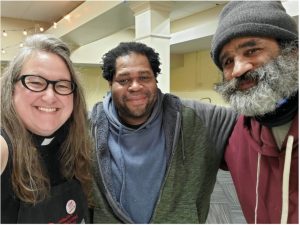
That care-filled cultivation of relationship made working through that incident with each person involved possible. It also made it possible for everyone to return to Jubilee without further incident.
Our guests know that they are collaborators in Jubilee Café as much as anyone.
Leon, Jospeh, and I finish our conversation. They finish their meals, gather their things, and head out for night.
As always, when Leon goes toward the door and heads down the hall, he turns his head and calls out, “Love you, family!” with Psalm 46:10 below his feet, blessing every step. They open the door and go out into the night.
After filing reports for the evening, some of our lead volunteers sit at Table 1. “We were just talking about the floor,” I say the little group.
Grace perks up. “I remember writing on the floor.” Grace, who uses they/them pronouns, has known about CUCC from the time they were little. “I started volunteering in 2018 when my dad was a member [of the church] here. He wanted me to volunteer.” Grace did as their dad hoped, but didn’t keep it up. “I don’t know how I got back into it, except that Sophie and I decided we wanted to do something on a regular basis. Volunteering here regularly was an excuse to see her every week,” Grace laughs, thinking of the crush they had on Sophie. That crush has turned into more and the two still volunteer with Jubilee regularly.
In addition to volunteering, Sophie also works at one of our community partners, Sola Gratia Farms. Grace sometimes volunteers there too. Together, they often get to see the full journey of food—from seed to sprout, growth to harvest, from box of vegetables with dirt still clinging to kitchen prep sink, from oven and sauté pan to plate, then finally from mouth to belly of every satisfied guest. “There’s a fulfillment in me being here,” Grace concludes. It’s about watching the raw ingredients become a delectable meal, but it’s also about the community that is created and sustained in this place.
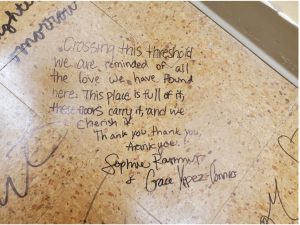
We’ve long said that we feed more than hungry bellies at Jubilee Café, and Grace knows this to be true. On any given night, we have any number of brand new volunteers. Grace readily mentors new people, helping them embody the expectations inherent in this place, the same expectations stated in our mission, the ones that Leon and Joseph know to be true: through the practice of kindness, peace, respect, love, and eating together, brokenness gets restored. Those values start with how our volunteers are treated. Grace helps make that happen, having grown into a vital member of the Jubilee community, they now assume leadership roles and is trusted to do so because they get the bigger picture. That’s evident in what Grace and Sophie wrote on the floor, “Crossing this threshold, we are reminded of all the love we have found here. This place is full of it, these floors carry it, and we cherish it. Thank you! Thank you! Thank you!” they wrote.
“I love how excited everyone was when we got the new floor,” Grace smiles, and then smirks. “To be frank, I didn’t pay that much attention in the lead up, but then when it happened, it was so exciting. People were excited like they are when there’s a new baby!”
“I was not excited about the new floor,” Marla interjects, much to everyone’s surprise. Marla is new to CUCC and volunteering at Jubilee but has known about our church forever. She is deeply invested in the recovery community in town and many meetings happen at CUCC. Recovery groups use Fellowship Hall, where Jubilee happens, for parties, too. “I came to an event in between the carpet purchase and installation. I walked in and thought someone had spilled icing all over the floor. I went to scrub it off. We’re supposed to leave things better than we found them! Once I started scrubbing I realized what was going on.” We all laugh—if you are going to get new carpet, might as well put up a fresh coat of paint and use the old carpet as a drop cloth. And that’s what we did.
“If you are poor or an addict,” Marla says, speaking from her own experience of having been an addict for years, “There’s this way you get treated—like you should just be grateful for the shit you have. And that makes people feel like trash. But there’s so much intentionality about this place—to treat people so carefully, like real human beings. There’s an ethic of care that is greater than bare basics. I didn’t know about the floor, but it doesn’t surprise me. It’s like a protective layer over this place.”
If you talk with anyone in recovery, they will tell you: the cure for addiction is community. We know this to be true at Jubilee—community will cure so much of what ails us. Our world, especially in this moment in history, will tell you a counter story—that difference is suspect, so many people are to be feared, and self-reliance will save us.
We tell a different story at Jubilee Café.
We tell the story of mutual respect, care, and the cultivation of a community that matters to every person who claims it as their own. There’s no good reason why a PhD candidate in physics should sit in a church basement eating dinner with a guy who sleeps in a parking garage. Same goes for the Fullbright scholar and the senior citizen on a fixed income, the immigrant family and the hipster kids, the little church lady and the trans man, the guy who just lost his job and all the women from the sober house who eat together on Monday nights, the single mom and the sorority girl. Our world creates all kinds of reasons why people shouldn’t pay attention to one another, shouldn’t care, shouldn’t mind one another, and one another’s ways.
There are plenty of reasons, and it seems some in our world are manufacturing more by the day, but none of them are good.
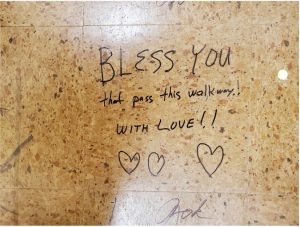
There are good reasons, though, to come together, to intentionally cultivate community in an ever-contentious world, to call one another neighbor and friend, to holler, “Love you, family!” to people with whom you have precious little in common, except…except this: you all believe that when we practice kindness, peace, respect, and love, restoration is possible. The brokenness of our world, our cities, ourselves, and the earth itself, can be made whole again with the intentionality and the risk of relationship, with careful attention paid to one another, and the recognition that there are blessings to be had, written into the bedrock beneath our feet.
Even if we can’t see them, they’re still there.

